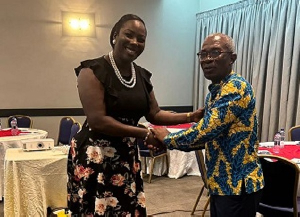 Francis Ameyibor and Jennifer Nelson
Francis Ameyibor and Jennifer Nelson
Francis Ameyibor, Executive Director of the CDA Consult, on Wednesday, issued a passionate appeal for the mobilization of resources to provide free Human Papillomavirus (HPV) vaccinations to girls and women in Ghana.
He said the call to action aims to combat cervical cancer, a preventable yet
a devastating disease that claims thousands of lives annually.
Mr. Ameyibor emphasized that mass HPV vaccination is crucial to saving lives
and preventing unnecessary suffering.
"We need to act now to protect our girls and women from this preventable
disease. By mobilizing resources and offering free HPV vaccinations, we can significantly reduce the incidence of cervical cancer in Ghana," he said.
Mr. Ameyibor, who was speaking during the engagement with the media in Accra,
said expanding access to HPV vaccination will not only save lives but also have
a positive impact on the country's healthcare system and economy.
“By preventing cervical cancer, Ghana can reduce healthcare costs, increase
productivity, and improve the overall well-being of its citizens,” he said.
The call to action forms part of the CDA Consult’s Cervical Cancer Prevention Change Paradigm Advocacy campaign, which aimed at persuading decision-makers to provide free HPV vaccinations and to increase screening, prevention, and treatment in order to end cervical cancer in Ghana.
In order to have the greatest possible impact, the CDA Consult Cervical Cancer
Prevention Change Paradigm Advocacy campaign also aims to dispel common
misconceptions about cervical cancer screening, vaccination, and treatment and
will organize workshops and vaccination, screening, and treatment for patients
across the country.
Mr. Ameyibor urged the government, healthcare organizations, and stakeholders
to join forces in mobilizing resources and supporting the mass HPV vaccination
effort.
"Together, we can make a difference and create a cancer-free future for
generations to come. Let's unite to stop cervical cancer in Ghana! Support the call for mass HPV vaccination and be part of the solution to this preventable health crisis. Together, we can save lives and build a healthier future for all,” the CDA Consult Executive Director stated
Speaking on the essence of HPV vaccination, Jennifer Nelson, a Preventive
and Occupational Health Management Consultant emphasized that cervical
cancer, caused by HPV, is a preventable disease, but unfortunately it claims
thousands of lives annually in Ghana.
"It's unacceptable that women in Ghana continue to die from a disease that can
be prevented with a simple vaccination," she said.
Ms. Nelson, who is also the CEO of the preventive health organisation, Lifeline
Haven Company Limited, highlighted the numerous benefits of providing free
HPV vaccination.
She mentioned that mass HPV vaccination would help the prevention of cervical cancer and other HPV-related diseases, reduce healthcare costs associated with treating cervical cancer, increase women's productivity and participation in the workforce, and improve the overall health and well-being of women and girls.
The Lifeline Haven Company Limited CEO urged the government, healthcare
organizations and stakeholders to join forces in making HPV vaccination a
national priority.
"We need to work together to ensure that every girl and woman in Ghana has
access to this life-saving vaccine," she said.
Dr. Chris Kpodar, Chairman and CEO of Solomon Investments Ghana Limited,
who chaired the strategic stakeholders' engagement session, underlined the
necessity for authorities to implement a national policy to vaccinate all young
women against cervical cancer.
As a member of CDA Consult's board of directors, Dr. Kpodar emphasised that
low-and middle-income nations had the highest incidence and fatality rates of
cervical cancer.
According to him, there are significant disparities in this that are caused by
social and economic factors, a lack of access to national HPV vaccination
programs, and cervical screening and treatment facilities.
Dr. Kpodar, who is also a former UN Consultant for Africa and the Middle East,
pointed out that screening for pre-cancerous lesions and administering preventative vaccinations against HPV are efficient and reasonably priced
methods of preventing cervical cancer.